
Conflict Studies Quarterly
Scope & Guideline
Exploring the intersections of conflict and resolution.
Introduction
Aims and Scopes
- Conflict Dynamics:
The journal emphasizes the analysis of conflict dynamics across different regions, exploring how socio-political and economic factors contribute to conflicts. - Conflict Resolution Mechanisms:
A core focus is on indigenous and traditional conflict resolution mechanisms, examining their effectiveness and implications for peacebuilding. - Impact of Armed Conflict:
The journal investigates the socio-economic impacts of armed conflict on affected populations, including displacement, security concerns, and resilience strategies. - International Relations and Conflict:
It covers the intersection of international relations and conflict, addressing issues such as proxy wars, regional security dynamics, and the roles of international organizations. - Methodological Innovations:
The journal encourages methodological and epistemological advancements in conflict studies, promoting diverse approaches to understanding and analyzing conflicts.
Trending and Emerging
- Local and Community-Based Conflict Resolution:
There is a growing interest in local and community-based approaches to conflict resolution, highlighting the effectiveness of indigenous methods in managing conflicts. - Impact of Climate Change on Conflict:
Emerging research is increasingly addressing the interplay between climate change and conflict, investigating how environmental factors exacerbate existing tensions. - Displacement and Security Concerns:
The security concerns of internally displaced persons have garnered significant attention, reflecting the humanitarian crises resulting from ongoing conflicts. - Role of International Actors in Conflict Resolution:
There is an increasing focus on the roles of international actors, such as the European Union, in mediating conflicts and facilitating peacebuilding efforts. - Interdisciplinary Approaches to Conflict Studies:
The journal is seeing a trend towards interdisciplinary research, integrating perspectives from economics, sociology, and political science to enrich the understanding of conflicts.
Declining or Waning
- Historical Conflict Analysis:
There has been a noticeable decrease in papers focusing on historical conflicts, as contemporary conflicts and their immediate implications gain more attention. - Domestic Policy Responses:
Research on domestic policy responses to conflicts, particularly in the realm of governance and state-building, appears to be waning, possibly overshadowed by more urgent security and humanitarian issues. - Theoretical Frameworks:
Discussion surrounding theoretical frameworks in conflict studies has diminished, with a shift towards empirical case studies and practical applications of conflict resolution strategies.
Similar Journals
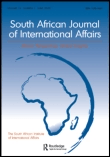
South African Journal of International Affairs-SAJIA
Navigating the Complexities of Global InteractionsThe South African Journal of International Affairs (SAJIA), published by Routledge Journals under Taylor & Francis Ltd, is a leading academic publication dedicated to advancing the study of political science and international relations within the African context. Since its inception in 1993, SAJIA has distinguished itself in the academic community, achieving a Q3 ranking in 2023 among its peers, reflecting its commitment to high-quality research and scholarly discourse. With a current Scopus rank of #285 out of 706 within its field, SAJIA provides a platform for researchers, professionals, and students to engage with contemporary global issues, particularly those pertinent to Africa and its interactions on the world stage. Although it does not operate on an open access model, the journal's rigorous peer-review process ensures that published articles contribute significantly to the academic corpus. The journal's scope encompasses a wide array of topics, positioning it as an essential resource for anyone interested in the dynamics of international affairs.
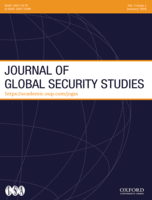
Journal of Global Security Studies
Unraveling the intricacies of international relations.The Journal of Global Security Studies, published by Oxford University Press, is a premier scholarly journal dedicated to advancing the field of political science and international relations, with a particular emphasis on global safety research. Established in 2016, this journal has rapidly made its mark, attaining a distinguished Q1 ranking in both Political Science and International Relations as well as Safety Research categories in 2023, reflecting its high impact and contribution to the discourse surrounding global security issues. Boasting a strong standing in Scopus, ranked #133 out of 706 in Political Science and #36 out of 109 in Safety Research, it serves as a vital platform for scholars, practitioners, and students eager to explore emerging trends and pivotal studies in security matters. Although not open access, the journal ensures that rigorous peer-reviewed research is made available to a wide audience. The Journal of Global Security Studies continues to foster critical dialogue and research, making it an essential resource for anyone interested in the complex landscape of global security.
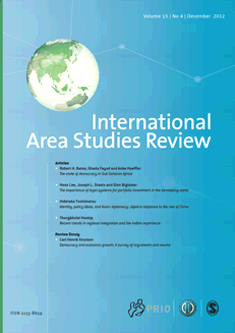
International Area Studies Review
Illuminating Emerging Areas of Inquiry in Global StudiesInternational Area Studies Review is a pivotal journal in the fields of Political Science, International Relations, and Sociology, published by SAGE Publications Ltd. With an ISSN of 2233-8659 and an E-ISSN of 2049-1123, this journal serves as a distinguished platform for scholarly discourse, exploring the complexities of international affairs and area studies since its inception in 1997. Housing contributions that bridge theoretical perspectives and empirical research, it plays a critical role in advancing knowledge and understanding within its domain. Currently ranked in the Q3 category for both Political Science and Sociology, the journal demonstrates consistent scholarly engagement, reflected in its Scopus rankings, with a notable position in the 55th percentile for Political Science and International Relations. While not open access, the International Area Studies Review remains a vital resource for researchers, professionals, and students eager to contribute to and engage with emerging areas of inquiry in a rapidly evolving global landscape.
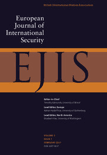
European Journal of International Security
Navigating the evolving landscape of global security research.The European Journal of International Security, published by Cambridge University Press, stands as a premier platform for scholarly discourse within the realms of political science, international relations, sociology, and safety research. With its esteemed Q1 ranking in multiple categories for 2023, this journal is recognized for its high-impact research contributions, positioned within the top percentile of its field. Covering a broad spectrum of topics, from security policy analysis to sociopolitical dynamics, the journal aims to foster a deeper understanding of contemporary security challenges while advancing academic inquiry. Notably, with its ISSN 2057-5637 and E-ISSN 2057-5645, the journal provides essential insights for researchers, practitioners, and students alike, affirming its commitment to excellence in the academic landscape of the United Kingdom and beyond. With a converged focus spanning from 2016 to 2024, the journal encourages contributions that critically address the evolving nature of international security in a complex world.

All Azimuth-A Journal of Foreign Policy and Peace
Empowering research for a peaceful future.All Azimuth - A Journal of Foreign Policy and Peace is a leading academic journal dedicated to the exploration and analysis of foreign policy dynamics, conflict resolution, and peace studies. Published by the CENTER FOREIGN POLICY & PEACE RESEARCH in Turkey, this journal serves as a crucial platform for scholars and practitioners aiming to address pressing global issues. With a prestigious Q1 category ranking in Political Science and International Relations, and a noteworthy Scopus rank of #263 out of 706 in its field, All Azimuth is recognized for its impactful contributions to the academic community. The journal, operating under an open access model, is committed to providing unrestricted access to high-quality research, fostering collaboration, and enhancing knowledge dissemination across disciplines. Since its inception in 2012, All Azimuth has become an essential resource for researchers, professionals, and students who seek to deepen their understanding of international relations and peace policies, making significant strides towards resolving global conflicts and promoting sustainable peace.

Revista UNISCI
Connecting Scholars, Bridging IdeasRevista UNISCI is a distinguished open-access journal published by UNIV COMPLUTENSE MADRID, SERVICIO PUBLICACIONES, dedicated to advancing the discourse in the fields of Political Science and International Relations. Since its inception in 2005, it has established a platform for emerging scholars and seasoned researchers alike to share innovative ideas and findings. With an E-ISSN of 2386-9453, Revista UNISCI is accessible to a global audience, facilitating knowledge dissemination in an increasingly interconnected world. The journal has been categorized in Q4 quartile for 2023, highlighting its relevance in the competitive landscape of academic publishing, while its Scopus rank of 566 out of 706 positions it among the prominent voices in the discipline. As the journal enters its converged years from 2015 to 2024, it aims to foster interdisciplinary dialogue and contribute to ongoing research debates, ultimately enriching the academic community’s understanding of critical global issues.
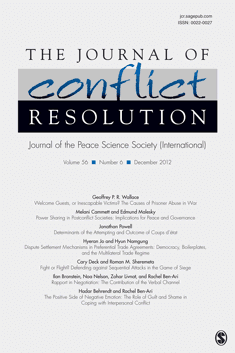
JOURNAL OF CONFLICT RESOLUTION
Unlocking strategies for sustainable peace and resolution.JOURNAL OF CONFLICT RESOLUTION, published by SAGE PUBLICATIONS INC, is a premier academic journal that has been instrumental in advancing the understanding of conflict dynamics since its inception in 1957. With a notable Q1 ranking in the fields of Business, Management and Accounting, Political Science and International Relations, and Sociology, this journal stands out as an essential resource for researchers, practitioners, and students alike, fostering a deeper exploration into the intricacies of conflicts and their resolutions. The journal is indexed under ISSN 0022-0027 and has an E-ISSN of 1552-8766. Continually updated with cutting-edge research, it boasts impressive Scopus rankings, holding the 53rd position out of 706 in Political Science and International Relations and 169th out of 1466 in Sociology and Political Science. The JOURNAL OF CONFLICT RESOLUTION is vital for anyone engaged in the study of conflict management and resolution strategies, offering pivotal insights and evidentiary support to drive forward debate and policy-making in this ever-evolving field.

Economics of Peace and Security Journal
Exploring the Economic Pathways to Global PeaceEconomics of Peace and Security Journal, published by ECONOMISTS PEACE & SECURITY, serves as a critical platform for scholarship focusing on the intersections of economics, peacebuilding, and international relations. With an ISSN of 1749-852X, this interdisciplinary journal aims to explore the economic dimensions of peace and security, fostering a deeper understanding of how economic policies can influence stability worldwide. Despite its current standing in the Q4 quartile across various categories, including Economics and Political Science, the journal plays an essential role in advancing research on pressing global issues. By providing insightful analyses and empirical studies, it engages researchers, students, and policymakers in discussions that can lead to effective strategies for conflict resolution and sustainable economic practices. Although it currently offers limited access options, the aspirations for broader dissemination underscore its importance in contributing to the ongoing dialogue surrounding peace and security economics. Join the conversation and contribute to this evolving field as it navigates a complex and dynamic global landscape.
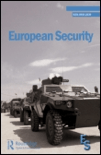
European Security
Pioneering Research in Political Science and International RelationsEuropean Security is a leading interdisciplinary journal published by ROUTLEDGE JOURNALS, TAYLOR & FRANCIS LTD, dedicated to advancing the understanding of security issues within the realms of Political Science and International Relations. With an impressive Impact Factor and a Q1 ranking in its field as of 2023, this journal has solidified its position as an influential platform for scholars and practitioners alike, ranking #93 out of 706 in the Scopus database. Since its inception in 1992, European Security has provided a forum for original research, analytical essays, and review articles that explore the complexities of security, conflict, and cooperation in the European context and beyond. The journal's commitment to high-quality scholarship is reflected in its rigorous peer-review process and the diverse perspectives it fosters. Although offering subscription-based access, the content within is invaluable for anyone engaged in the study of contemporary security challenges. Whether you are a researcher, professional, or student, European Security is essential reading for deepening your understanding of the dynamic and evolving landscape of international security.

WASHINGTON QUARTERLY
Exploring the nuances of global political landscapes.WASHINGTON QUARTERLY, published by Routledge Journals, Taylor & Francis Ltd, is a premier academic journal that has established itself as a vital resource in the fields of Law, Political Science, and International Relations. With a rigorous publication history since 1978 and a convergence slated to continue until 2024, this journal enjoys a commendable reputation, reflected in its Q1 and Q2 rankings across multiple categories as reported in 2023. It holds impressive positions within the Scopus rankings, boasting a percentile of 85th in Social Sciences - Law and 76th in Political Science and International Relations. The journal aims to foster a deeper understanding of global political landscapes and legal frameworks while providing insightful analyses and discussions that resonate with researchers, professionals, and students alike. Although it is not currently available as an Open Access publication, the contributions published within its pages continue to influence academic discourse and policy-making worldwide. Located in the United Kingdom, WASHINGTON QUARTERLY remains committed to advancing scholarship and knowledge in its dynamic fields.